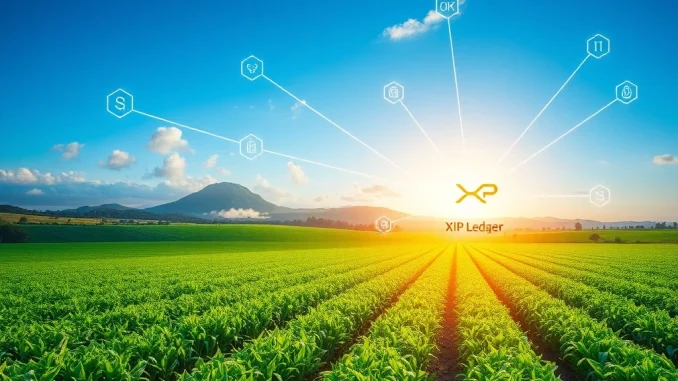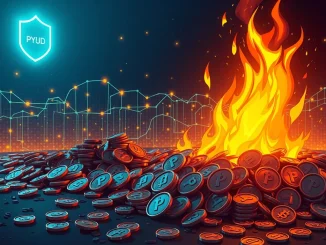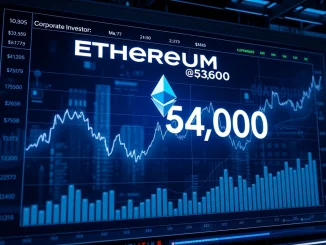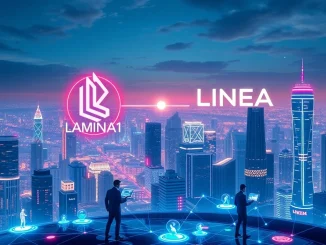
Get ready for a seismic shift in finance! Brazil is making waves in the blockchain world, and the XRP Ledger is at the heart of it. A groundbreaking initiative by Brazilian fintech VERT is set to revolutionize the nation’s massive agribusiness sector by tokenizing a staggering $130 million in agribusiness receivables. This isn’t just a technical upgrade; it’s a leap towards unprecedented efficiency and transparency in a market ripe for innovation. Let’s dive into how this move is positioning Brazil as a leader in the future of finance.
Why is the XRP Ledger a Game-Changer for Agribusiness Credit?
Brazilian fintech VERT has officially launched a cutting-edge blockchain-based credit platform built on the XRP Ledger. The primary goal? To streamline credit operations within Brazil’s vital agricultural sector. By tokenizing a R$700 million (approximately $130 million USD) Agribusiness Receivables Certificate (CRA), VERT is transforming a traditional financial instrument into a digital asset.
- Real-time Visibility: Each credit event is recorded on-chain, offering unparalleled transparency and control for all parties involved.
- Efficiency Boost: The initiative tackles long-standing inefficiencies in Brazil’s $200 billion private credit market, notorious for slow settlement times.
- Low-Cost Transactions: The XRP Ledger’s inherent design allows for fast, low-cost transactions, making large-scale securitization projects more viable.
- Regulatory Adaptability: Smart contracts automate metadata tracking, reporting, and execution, ensuring compliance while reducing manual errors and delays.
Gabriel Braga, VERT’s Director of Digital Assets, highlighted the platform’s ability to “record operation events in the most granular way possible, ensuring traceability and transparency approaching real time.” This capability is crucial, addressing growing investor demands for clarity in credit assets as Brazil’s regulatory landscape evolves to embrace tokenized structures.
Brazil Tokenization: Paving the Way for a Modern Financial Landscape
The tokenization of CRAs is perfectly aligned with the critical role agribusiness plays in Brazil’s economy, contributing over 20% to its GDP. This innovative approach simplifies complex credit operations, significantly minimizing processing time and enhancing risk management. By leveraging blockchain technology, VERT’s system also incorporates internal and regulated backups to secure asset movement and prevent manipulation, building a robust framework for future growth.
Ripple’s LATAM Managing Director, Silvio Pegado, emphasized the significance of this initiative, calling it a “meaningful step toward better credit management.” His comments underscore the immense potential of blockchain to modernize financial markets that are foundational to national economic growth. The strategic adoption of Brazil tokenization in such a vital sector serves as a powerful testament to the country’s forward-thinking approach to digital finance.
How Does Blockchain Finance Enhance Transparency and Efficiency?
The core of VERT’s solution lies in its intelligent integration of the XRP Ledger with an EVM-compatible sidechain. This hybrid architecture supports robust smart contract functionality while maintaining the XRP Ledger’s energy-efficient consensus mechanism. The result is a system that dramatically reduces operational costs compared to traditional financial infrastructures, making it highly attractive for large-scale securitization projects.
This approach to blockchain finance isn’t just about speed; it’s about building trust. By creating an immutable, transparent record of all transactions, VERT is addressing a long-standing pain point in credit markets: the lack of granular, real-time data. This enhanced visibility is not only beneficial for regulators but also for investors who demand greater insight into the underlying assets supporting their investments.
The Future of Tokenized Receivables: What’s Next for VERT?
Ripple’s endorsement of this initiative signals strong confidence in the XRP Ledger’s capacity to support institutional-grade infrastructure. VERT has ambitious plans to expand the platform, aiming to handle over $500 million in future structured finance operations. Building on its existing framework of over 350 credit transactions, the firm intends to tokenize additional asset classes, further solidifying Brazil’s position as a hub for tokenized finance.
The adoption of the XRP Ledger in high-value, regulated applications like agribusiness credit demonstrates its potential to bridge the gap between traditional and decentralized finance. This pioneering move by VERT could catalyze broader blockchain adoption across Brazil’s financial sector. While scalability and regulatory alignment remain critical challenges, analysts view VERT’s initiative as a potential model for similar projects globally, provided it continues to demonstrate long-term cost efficiency and security. The rise of tokenized receivables is truly upon us, and Brazil is leading the charge.
Conclusion: A New Horizon for Global Finance
VERT’s bold move to tokenize agribusiness receivables on the XRP Ledger is more than just a local success story; it’s a blueprint for the future of global finance. By enhancing transparency, reducing costs, and improving efficiency, this initiative not only empowers Brazil’s vital agribusiness sector but also sets a precedent for how blockchain can modernize complex financial markets worldwide. As more countries and industries explore the benefits of tokenization, the XRP Ledger continues to prove its capabilities as a robust and adaptable platform for institutional-grade applications. This is a clear signal that the digital transformation of finance is accelerating, and innovative solutions like VERT’s are leading the way.
Frequently Asked Questions (FAQs)
What is the Agribusiness Receivables Certificate (CRA) being tokenized?
The CRA is a financial instrument in Brazil that represents expected payments from farming businesses. By tokenizing it, VERT converts this traditional asset into a digital token on the blockchain, making it more liquid and transparent.
Why did VERT choose the XRP Ledger for this initiative?
The XRP Ledger was chosen for its fast and low-cost transaction capabilities, energy-efficient consensus mechanism, and its ability to integrate with an EVM-compatible sidechain for robust smart contract functionality. This combination supports institutional-grade applications and regulatory adaptability.
How does tokenization benefit Brazil’s agribusiness sector?
Tokenization simplifies credit operations, significantly reduces processing times, enhances risk management through real-time visibility, and increases transparency for investors. This modernization helps the agribusiness sector compete more effectively in the global financial landscape.
What are VERT’s future plans for the platform?
VERT plans to expand the platform to handle over $500 million in future structured finance operations. The firm also aims to tokenize additional asset classes, further establishing Brazil as a leader in tokenized finance.
What challenges might this initiative face?
While promising, potential challenges include ensuring scalability for even larger volumes of transactions and navigating the evolving regulatory landscape to maintain compliance as tokenized structures become more prevalent in traditional finance.



